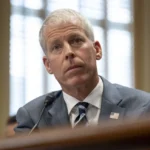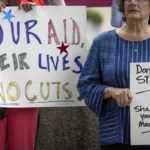FRIDAY FOCUS: Wyoming Rescue Mission Leaders Serve Those Struggling with Homelessness
In the wake of national headlines about the destruction of an Econo Lodge in Casper, shelter leaders speak out
- Published In: Other News & Features
- Last Updated: Sep 08, 2023

Wyoming Rescue Mission Executive Director Brad Hopkins said the Casper facility currently is home to 118 residents. (Courtesy photo from the Wyoming Rescue Mission)

By Carrie Haderlie
Special to the Wyoming Truth
Central Wyoming’s largest community has made national headlines, as news outlets across the country have covered what Casper Mayor Bruce Knell has called a “homeless crisis” in town.
Knell told the Wyoming Truth that he believes the recent destruction at the now-abandoned Econo Lodge at 300 W. F St. was caused by a subset of people who are not allowed at the Wyoming Rescue Mission during the day.
The Wyoming Truth spoke with Wyoming Rescue Mission Executive Director Brad Hopkins and Development Director Cheryl Hackett Wednesday about their on-the-ground work with people struggling with homelessness, misconceptions about the population they serve and what other factors may contribute to problems like the condition at the Econo Lodge on F Street. What follows are excerpts from the conversation.
Let’s talk about the mission of the Wyoming Rescue Mission.
Hackett: The Wyoming Rescue Mission restores homeless lives back to community independence with the love of Christ. If a person comes and checks in, obviously they have hit rock bottom. They are coming here and saying they need help, they need a place to stay. We do not require that anyone who walks through our door profess to be a Christian. We serve all people from all walks of life in our emergency services and mercy services. Sixty to 65% of the people that we serve … are people [from] Natrona County. . . . Within two to three weeks, people staying here are working at a job … One of my case managers recently told me he had approximately 60 men in his caseload, and all of them were employed. Under our emergency services, people are getting three meals a day and have a bed to sleep in. They have warm showers … Their laundry is washed individually each day.
Hopkins: We currently have 118 [residents] in house, and about 80 of those are in our Park Street Center.

Hackett: Of course, people coming out of addiction, the rate of relapse is very high. They might go out and drink alcohol or use drugs. On that day, they cannot access emergency services. They still receive mercy services. It is absolutely incorrect that people, I think the quote was, ‘That they cannot stay here,’ or that they get kicked out.
They still receive mercy services, which means they can come in at 10 p.m. at night, and they have to leave at 6 a.m. in the morning. They are provided with a sack lunch and they can still take a shower.
Hopkins: We do [also] run a [voluntary] Discipleship Recovery Program, serving people who are homeless due to a life-controlling addiction. That program is very faith-based, compelled by Christ, His life and message. We see the core human need of our existence to be spiritual, though we do serve physical needs. We do serve everybody, no matter their lifestyle choices, no matter what they believe, but the 12-month recovery program is very Christ-centered toward inner healing. . . . Everyone has a case manager, and we are sitting down with each guest, hearing their story and helping them craft a plan to move forward with their life. Ninety-five percent of our people really don’t want to be in their circumstance. It is a small percentage that seems to be getting news attention here lately. That is concerning from our perspective, because it seems like any problem in downtown Casper, the homeless are being scapegoated.
Can you elaborate on the mental health aspect of homelessness?
Hackett: So much of homelessness is rooted in addiction and trauma. I would say the trauma comes first, and addiction can come with that. We decided to be a beacon of light and hope to provide services to people who were truly in need. We have a mental health services coordinator who is specially trained in EMDR [eye movement desensitization and reprocessing] therapy and is licensed as a clinical therapist. We have a social work intern who is getting her master’s [degree in] social work doing a lot with trauma treatment. She wants to take an integrated look at, ‘How do we heal the whole person?’ … You have to break it down, and first help them see the changes they want to make while working on behaviors. To even get to a place where they can stabilize, you have to address trauma, and you have to address healing. Then they can look at making healthier choices.
When did homelessness become an issue in Casper? Is the Econo Lodge incident that garnered national attention something new or an isolated incident?
Hopkins: We started on CY Avenue 45 years ago, on the west side of downtown. There was a need then, and even Jesus says, ‘The poor you will always have.’ As far as the issue that really made headlines, there are a couple of challenges I have. I have personally spoken with the [Casper] Mayor [Bruce Knell], and said, ‘How do you know these squatters are homeless?’ There has been no specific reporting as to who is doing this. This is a reflection of a criminal-level drug problem. We have to be so careful labeling this a homeless problem. This is a reflection of issues in Casper that extend nationwide. We are awash in drugs and alcohol as a society. Wyoming is not immune. We have our own Wyoming people who really struggle, and this is why we are here.
What are some misconceptions about homelessness in Wyoming?

Hopkins: That any undesirable behavior in the community, it must be from some homeless person. That they must be from some other place. That surely, a Wyomingite would not do this, and surely, someone housed would not do this. But two years ago in Casper, we were summoned to a meeting … focused on teens who were causing mayhem in the David Street area. The police chief was reporting there were issues with vehicles being broken into and firearms being stolen. Largely, this was due to our local teen population. We know that that was an issue. I doubt that that issue has gone away. Blaming all these problems on the homeless … is a lack of ability to see the real piece of the problem.
How would you describe the 95% of folks who are working toward independence through your organization?
Hopkins: They don’t want to be homeless. … These are people that have personal value. They have dreams and aspirations. They want to be productive, and so many of them have kids and dependents and want to be able to provide and feel that sense of value as someone who is productive and not just a taker. Many of them are just suffering from a deeply broken heart. We’ve had highly educated people with us. You cannot put the homeless in one bucket. Some are single moms [with] children.
Statewide, the U.S. Census says we have a 10% poverty issue, and Natrona County is at 8%. But you look at that definition, and that is extreme poverty. That is $21,000 a year for a family of three. I don’t know who could survive on that. That is, like, 60,000 people in the state who are not making it. We are that safety net.
What can people in Wyoming do to better understand homelessness?
Hopkins: Come down to the Mission and see what we do firsthand. It is so eye-opening. People who come through are like, ‘Oh my gosh,’ because when your life is well-established, when you have comforts, and you see that our main dorm room is 40 bunk beds — we built a brand new shelter, but it is not luxurious by any means. It is pretty sobering. First is, get educated. Second is, get involved. We’re not the only organization in the state [doing this work]. But we try to reflect one of the greatest attributes of this state: . . . if you’re willing to do your part, we’re going to get behind you and make sure you succeed.
Check back tomorrow for our conversation with Casper Mayor Bruce Knell.













